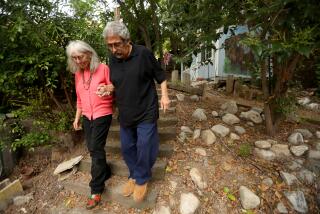Kids Need to Find Support
- Share via
Aparent’s Alzheimer’s disease is hard enough on adult children, but it can be even harder on kids--for whom there are few support groups or friends who understand what they’re going through at home.
Alzheimer’s Assn. chapters say they have had their hands full trying to serve the growing number of early-onset patients and their caregivers, and haven’t had the time or money to reach out to teenagers and younger children. That’s likely to change.
Paul Raia, a psychologist and director of patient care for the Alzheimer’s Assn., in Cambridge, Mass., started the first support group in the country for kids about a dozen years ago. It met twice a month at a church in Arlington, Mass., and offered intensive counseling.
“We saw all kinds of acute problems, depression, acting out, truancy, drug use,” said Raia. “You see the kids developing nightmares, having difficulty in school. They have difficulty with relationships with their peers. They may mature faster than they should in that they’re given too much responsibility for care. And they may not really experience a childhood.”
Although the group disbanded two years ago, Raia said, the need is even greater today, especially among the early-onset patients he sees now: “They all have kids at home.”
Julie Noonan Lawson knows what it’s like to be the child of a parent with early-onset Alzheimer’s; she was just 5 when her mother began forgetting to pick her up from school.
Lawson’s family has been devastated by an inherited form of Alzheimer’s. In addition to her mother and aunt, who died of it, three of her nine siblings have been diagnosed, including a sister who died at 58 and a 53-year-old sister now in the end stage.
Two of Lawson’s daughters, Caitlin, 16, and Chelsie,14, know that--although their 43-year-old mother is OK now--she has a 50-50 chance of eventually developing the illness if she finds out she carries the terrible genetic mutation. The girls know that if she has it, they, too, stand the same chance of inheriting it.
Lawson, a national Alzheimer’s advocate, says kids need professional support. She took her daughters to a hospice group near their home on Cape Cod, Mass., “but that was too traumatic. We’re not dealing with immediate death. Many of the kids had dads who had died of heart attacks.”
So her daughters set up their own support group. Two registered nurses volunteered to lead the group, which began with just Caitlin and Chelsie.
Along the way, they’ve picked up a child whose grandmother has Alzheimer’s, and more recently kids from a family in which the father has early-onset Alzheimer’s.
As Alzheimer’s progresses, the patient can display anger, hostility and aggression, emotions that can be deeply confusing to children unless there’s someone to help coach them through.
“What they’re dealing with is not a typical adult anger. It’s dementia anger,” Lawson said. “This is an adult and children are taught to respect adults. The children don’t know how to deal.”
The sessions have been really helpful, she said. “They’ve been able to look into the eyes of another human being who is their age and know that they know.”






